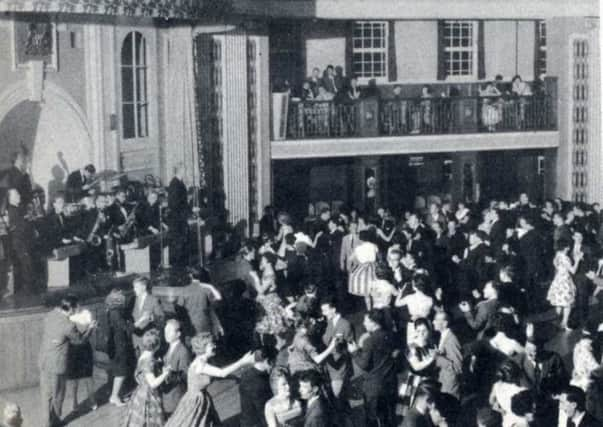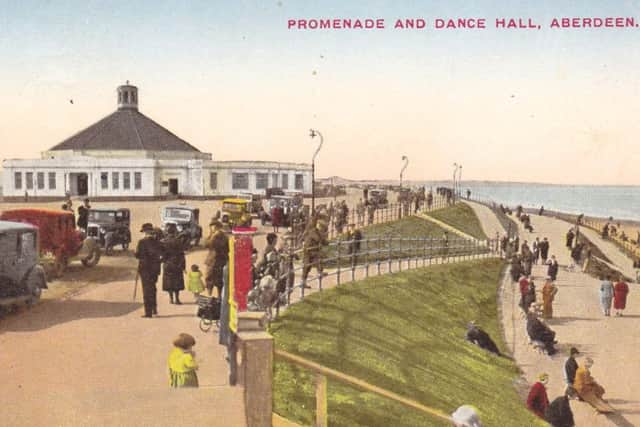Remembering 90 years of the good times at Aberdeen Beach Ballroom


Nine decades later, Aberdeen Beach Ballroom is still dealing with the good times.
Whether it is a strictly ballroom night of sequins and glitter balls, the gentle sway of an afternoon tea dance or even the spins and backdrops of Northern Soul night, the art deco gem continues to inspire romance, memories, and a special place in the heart of the city.
Advertisement
Hide AdAdvertisement
Hide AdA fountain even once cascaded in the middle of the dancefloor as its resident 12-piece band played. As the ballroom’s reputation grew, bands such as The Beatles, The Who, Small Faces and Pink Floyd signed up for a gig at the venue.


The venue was built as part of Aberdeen’s Beach Improvement Scheme, which was designed to boost the city as a tourist attraction as well as make this stretch of coastline more attractive to locals. The idea was to help people “linger” by the water and create a new wholesome way of spending time in Aberdeen.
The Beach Ballroom was part of the vision. It was built at a cost of £50,000 with a design competition giving architects Thomas Robert and Hume of Bathgate the job. Its legendary sprung maple dancefloor ‘floats’ on 1,400 steel springs, making it one of the largest of its kind in Britain.
“You get a really nice movement on the dancefloor,” said ballroom manager John Johnstone. “You are supposed to be able to dance the night away and not get tired. People really do say it is amazing.”
Advertisement
Hide AdAdvertisement
Hide AdThe floor could take 1,000 dancers with a restaurant and tea lounge seating 350 people at one time. By June 1929, the ballroom was making its mark. The Scotsman described it as a “magnificent” new venue decorated with “striking effectiveness and good taste.
“The circular ballroom, with its commodious balcony, brilliant lighting effects and coloured fountain, is an achievement which Aberdeen should be justly proud of. It will undoubtedly make it one of the main holiday magnets of the holiday season in Aberdeen.”
For the city fathers, taking on the management of the Beach Ballroom was a leap in the dark. At first it was impossible to find a tenant, with a unique agreement eventually drawn up with a city caterer to run the venue.
In 1934, the then Town Council decided to bring the arrangement to an end and undertake the management themselves. Considerable funds were spent to make the building more attractive with it also necessary to hire “a very good band”.
Advertisement
Hide AdAdvertisement
Hide AdThe venture paid off and the deficits recorded in the early years started to come under control.
Councillor James May said in 1936: “It is a very great attraction to holiday makers. Without it I am sure that the beach would not nearly be so well patronised and that a much smaller number of holidaymakers would come to Aberdeen.”
Sunday concerts at the ballroom won the support of the city’s chief constable and stopped young people “promenading the principal streets” – a pastime “so often resulted in evil results for young people of both sexes,” according to the Press and Journal.
The British Admiralty Board commandeered the Beach Ballroom during the Second World War, with servicemen sleeping on beds laid out on the dancefloor. It survived the blitz on Aberdeen, but was ravaged by fire in 1993 before being rebuilt.
Advertisement
Hide AdAdvertisement
Hide AdMr Johnstone said: “It is a very stylish venue and very unique and is one of the iconic buildings of Aberdeen. I always think of it as the ‘People’s Ballroom’ of Aberdeen. It means so much to so many people. A lot of people met their wives and husbands here.
“We get a lot of visitors who emigrated but want to come back to the place where they danced in the 1950s and 60s. After all these years, it still means an awful lot to them.”